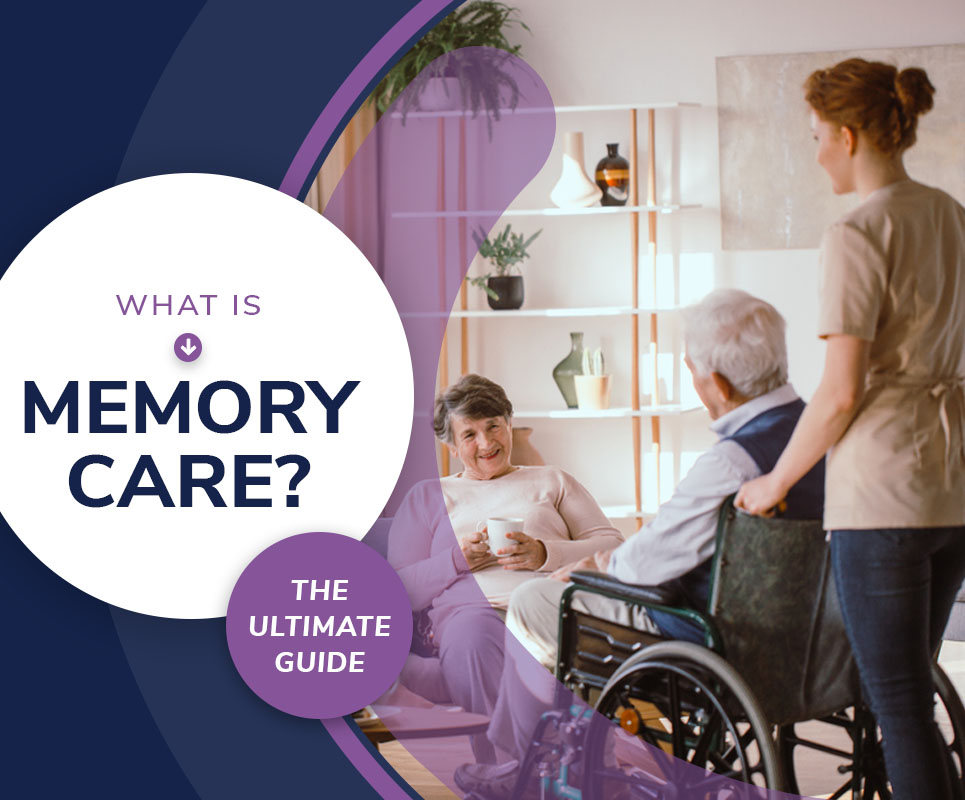What Is Memory Care: The Ultimate Guide
Memory care refers to live-in facilities that are intended especially for elderly adults experiencing dementia and Alzheimer’s. Memory care can significantly improve the quality of life for some people with dementia, but it is a big change, so you want to make sure it’s the right move for your loved one. Here’s everything you need to know about what memory care is and how to tell if your loved one might benefit from it.
What Makes Memory Care Different?
While memory care shares some overlap with assisted living facilities, they also have some distinct differences as well. First of all, both of them provide housing and assistance for elderly adults. Staff help residents with daily activities, such as bathing, grooming, getting dressed in Alzheimer’s clothing and taking medications. The facilities provide three meals a day as well as housekeeping and laundry service. Exercise classes are usually offered, and other classes or social activities may be offered as well. The facilities also offer transportation for essential activities, such as taking residents to and from doctors’ appointments.
That being said, memory care facilities have some distinct characteristics that set them apart from regular assisted living facilities. To start off, staff have typically received specialized training that makes them more qualified to care for people with dementia and memory loss. There is usually a higher staff-to-patient ratio at memory care facilities than at assisted living facilities, so residents get more face time with staff.
They also offer therapies and activities that are meant to help maintain cognitive function and enhance memory in people with dementia. Staff also make sure that residents are eating meals and taking medications, whereas residents are usually allowed to be more self-directed at assisted living facilities.

Memory care buildings are also specially designed to benefit and protect people with dementia. For one, they have secured entrances and exits to prevent wandering, such as doors with alarms and elevators that require a code or card to operate. Outdoor spaces will also be enclosed so that residents can enjoy time outside safely. Residents might also be given a tracking bracelet to allow staff to monitor their location and quickly find them in case they go missing. The building itself might be designed to reduce confusion and help residents find their way around.
Shop Women’s Adaptive Clothing
Signs Your Loved One Might Need Memory Care
Not sure whether or not your loved one currently needs memory care? Here are eight that your loved one might benefit from being moved into memory care:
Their behavior is changing.
Changes in behavior are usually the first indications that your loved one is struggling with dementia, and they may be subtle at first. They may be more easily irritated and agitated or otherwise experience changes in mood. They may also withdraw from family, friends and hobbies; refuse gifts for elderly parents; or show other antisocial tendencies. They may pay bills late or forget to pay them outright and, over time, they will neglect basic daily activities such as feeding and grooming themselves. Once these behavior changes reach a certain point, they will need to be moved into a memory care facility.

They wander away frequently.
Normal homes are not designed to prevent people with dementia from wandering away, and even your best precautions might not be able to keep them inside the house. If your loved one frequently wanders off and gets lost, then it might be in their best interests to move them into a memory care facility where they won’t be able to get out.
Their safety is in question.
Wandering isn’t the only way that your loved one’s health can be in danger. People with dementia can lose weight rapidly because they forget to eat or injure themselves because they forget to turn off the stove. They can also sometimes pose a danger to others and may verbally and physically lash out if they become agitated. If you are worried for your loved one’s physical safety or that of other people, moving them into a memory care facility with trained staff can give you peace of mind and help protect them from themselves.
They experience confusion and disorientation.
A little bit of confusion — such as forgetting today’s date and remembering it later — is a normal part of the aging process. What isn’t normal is forgetting the season and year, the names of loved ones or how to drive a car. As their symptoms progress, this confusion and disorientation can greatly impact their daily life and also cause them to become agitated and lash out at others. Moving them into a memory care facility can give them a sense of stability and help to reduce these feelings of confusion and disorientation.

Their overall health is declining.
Dementia doesn’t just affect cognition: It can have very real impacts on your loved one’s physical health. Dementia can lead your loved one to miss doctors’ appointments, skip life-saving medication doses and neglect their personal hygiene. Getting them into memory care can help to halt this decline and allow them to live longer with a better quality of life than they could on their own.
The caregiver is overwhelmed.
Taking care of someone with dementia is very challenging, especially if you aren’t a professional caregiver. If you or a family member have been taking care of your loved one at home, their symptoms may one day progress to the point where you can no longer keep up. If the caregiver is becoming overwhelmed and experiencing caregiver burnout, then it’s time to have a conversation about moving your loved one into a memory care facility that can provide more advanced care.
They need more help than assisted living can provide.
Assisted living facilities may provide enough care for people in the early stages of dementia, especially if they are still able to keep a daily schedule on their own. However, these typically are not typically equipped with enough trained staff to cope with patients who have advanced dementia. Even if your loved one is already in assisted living, you might need to talk about moving them to a dedicated memory care facility so they can get the level of care that they need.
Choosing a Memory Care Facility
Choosing a memory care facility for your loved one is a big decision. You’ll want to ask friends, family members and doctors for recommendations and check out each facility’s ratings before you contact them. After you set up tours, you’ll want to carefully absorb each one during your visit and ask lots of questions so you can accurately compare facilities. To help you out, we’ve compiled a list of essential questions that you should ask during your memory care tours, broken down by category.
Building environment
- Is the building clean and well maintained?
- Are all spaces well lit and free of tripping hazards?
- Are there handrails and other safety features in each room?
- Does the building incorporate dementia-friendly design cues, such as color-coded hallways?
- Is the building well ventilated? Does the air smell clean and free of odors?
Safety and security
- Are there secure interior courtyards so residents can safely enjoy time outside?
- Do all doors and elevators require some kind of code or key to operate?
- Are there alarms on emergency exits so staff will be immediately alerted if a resident manages to get out?
- Are residents equipped with emergency alert systems?
- Are there any security personnel on site? If so, what does security presence look like?

Staffing
- What is the staff-to-patient ratio? What is the staff turnover rate?
- Is the same resident assigned to the same staff member every day?
- What specialty training do staff receive? What type of dementia techniques do they use?
- Are skilled nurses available if my loved one needs medical help?
- What other doctors or medical specialists are available for appointments?
- Is staff available 24/7 in case of an emergency? How many people are on staff for the night shift?
- How do staff care for patients who become agitated or exhibit aggressive behavior?
- What level of assistance is provided for everyday activities such as grooming or bathing?
- How often are housekeeping and laundry provided?
Programs and services
- Is dementia-specific programming such as art and music therapy offered? If so, what kinds?
- What other enriching activities are offered, such as art and skill classes?
- What exercise classes are available? Are accommodations offered for residents with limited mobility or other health issues?
- Are religious services offered and, if so, from what faiths and how often?
Meals
- Are there regular meal and snack times? Is the schedule flexible at all?
- Is the food appetizing and nutritious?
- Are accommodations made for dietary restrictions and medical diets?
- Do staff members ensure that residents are eating adequately?
- Can staff members assist residents with feeding if necessary?
Family involvement
- What are visiting hours? What is the procedure for family visits?
- What role do friends and family play in care?
- How are families notified of changes in the residents’ conditions or care plans?
- How often does care planning take place? Can families participate in that process?
- Can families communicate with the staff and, if so, how?
Medical services
- What is the procedure if an ER or hospital visit is required?
- How are families notified in case of a medical emergency?
- Is continuing care available for residents as their needs change? If not, at what point will they need to be moved into a different facility?
- Is hospice care available, or is a third-party hospice care team allowed to come into the facility?
- What types of care are not provided by the memory care facility?
- Do you provide transportation to doctor’s visits or allow medical staff to come visit residents on premise?
- Will a staff member accompany the resident during medical appointments or ER visits?
- What is your discharge policy?
- If a resident must leave for an extended period of time to go to rehab, can they return to the facility or will their spot be given to someone else?
Finances
- What is the monthly fee? Is that fee all-inclusive or are there additional costs?
- If the monthly is not all inclusive, what is the fee for a la carte costs?
- How often does the fee schedule change?
- Are there different cost rates for different levels of care?
- Does the facility require an entry fee or deposit?
- What is the cost difference for a private vs. a semi-private room?
- Do you accept any kinds of insurance? If so, which ones?
Looking for gifts for dementia patients that you can give to a loved one in a memory care facility? At Silverts, we offer gifts for both men and women that are specially designed to meet the needs of seniors. Order today and get free shipping on your U.S. order, no order minimum needed!
Image Credits
Impixdesign/Shutterstock.com
LightField Studios/Shutterstock.com
Ground Picture/Shutterstock.com
fizkes/Shutterstock.com
Monkey Business Images/Shutterstock.com






No Comments